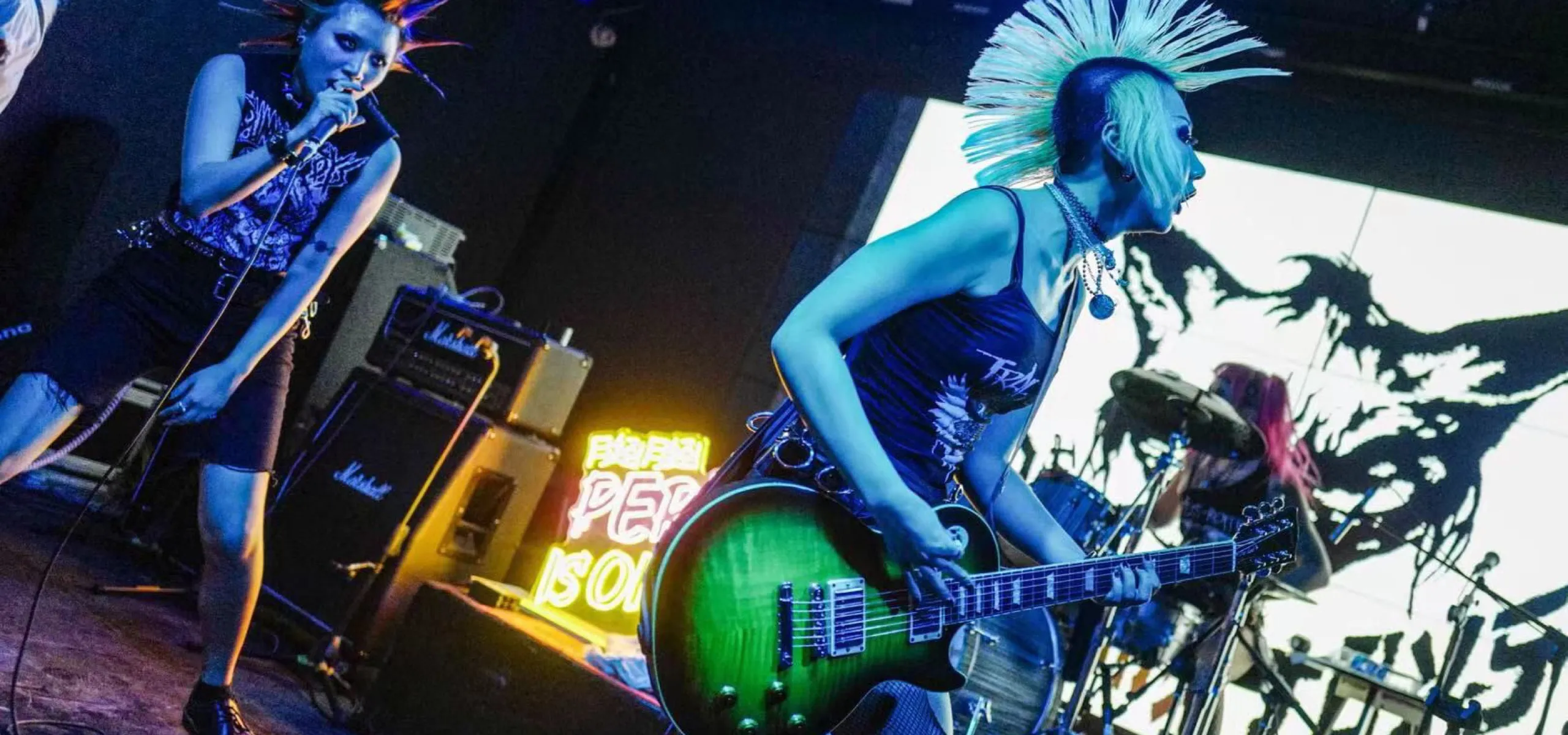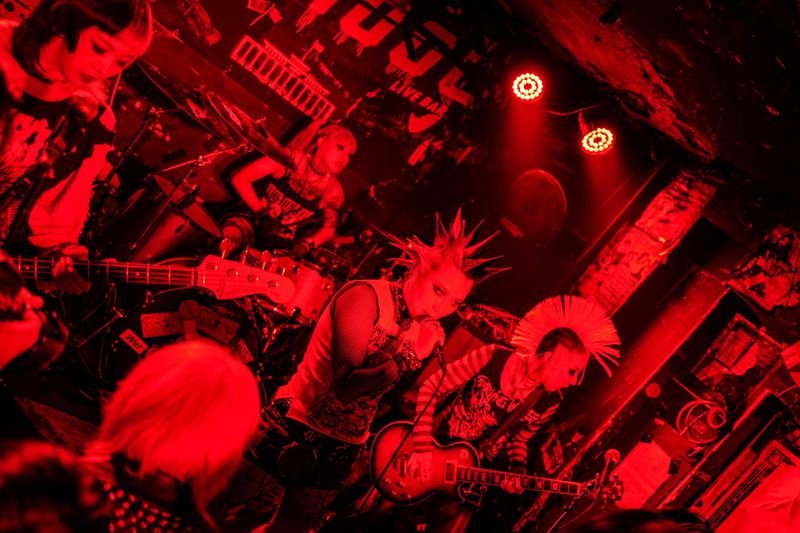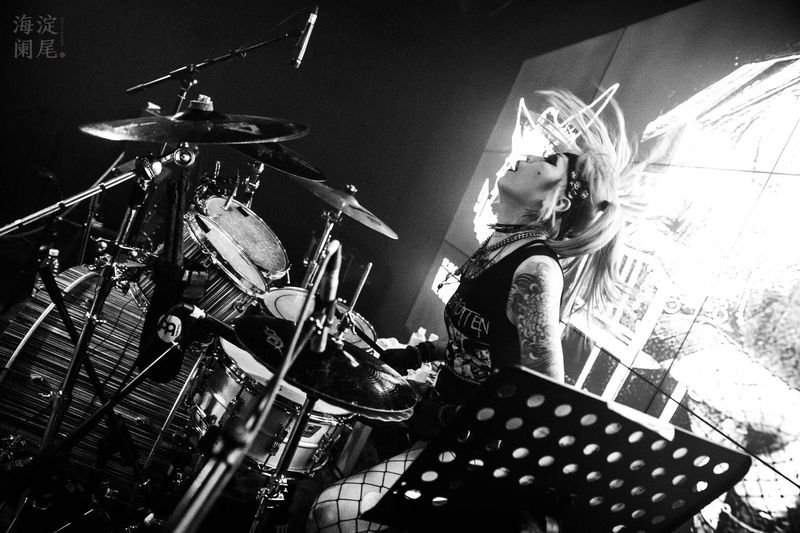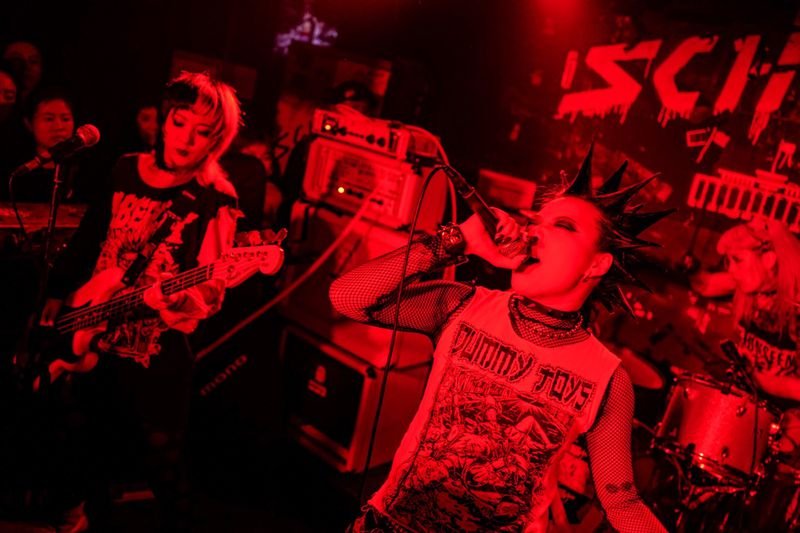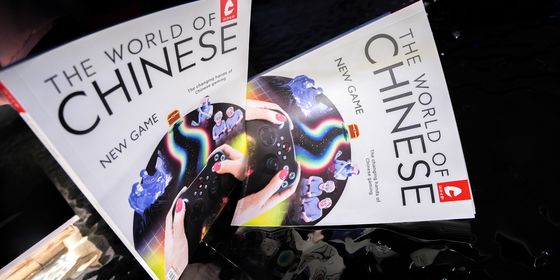TWOC sits down with all-female punk outfit Dummy Toys to talk about feminism, avoiding labels, and what music means to them
“Wrapping up in layers,
“I tried feeling this world from my burka.
“Tears flooded this land.
“No flowers grow there.”
Dummy Toys, an all-female punk band, scream these lyrics on their latest, unnamed record, on the plight of Afghan women which they started working on after the Taliban takeover of the country. The Qingdao-based band of lead singer Xiaokui, guitarist Birdie, bassist Huanzi, and drummer Qingqing, have been blasting out socially conscious punk since their founding in 2015.
In the day time, the millennial band members work in the city. By night they take to the cramped stages of local pubs, clubs, and dank music venues, with their mohawks, studded jackets, ripped jeans, and rip-roaring two-minute rock songs enrapturing small but devoted crowds.
Though they tell TWOC they reject “restrictive labels” (like, “female feminist punk band” for example), Dummy Toys associate themselves with the “Riot grrrl” movement of the US, and have been using music as a weapon to express their opinions on gender issues and the wider society as part of an underground music scene in China that has gradually become more open to female rock artists.
"Riot Grrrl," or baonü (暴女) in Chinese, emerged in the 1990s in the US as an underground feminist punk movement that combines feminism, punk music, and politics. It since spread to other parts of the world as a vehicle for music that promotes feminist agendas.
Inspired by Bikini Kill, the American band which pioneered the movement, Dummy Toys make music about social issues in China and across the globe with their lyrics frequently dealing with gender-related themes. In 2020, their song “Flying Young Girl,” expressed their anger over an incident in which a 19-year-old girl in Gansu province jumped off a building in 2018 after a high school teacher sexually assaulted her: “Ugly teachers! Onlooker devils! You killed the girl with your own hands! You’re all fucking murderers!” the band scream in the song, outraged by the fact that when the girl stood atop the building, some onlookers goaded her to jump and others live-streamed the act.
Meanwhile, the song “Anti-Sweet Girl” takes aim at the “masks” that girls wear to fit in with society: “Put your mask on daily, dream that everyone adores it.”
Though more female rock bands have emerged in China since Dummy Toys formed in 2015, all-female punk bands with a social agenda remain a rarity, and the punk genre is niche in general. On a phone call with TWOC, the four members of Dummy Toys talked about what it means to be an all-female punk band in China, and what keeps them playing after six years together. Their answers have been combined and edited for clarity:
What inspired you to form a punk band?
We used to be in different bands, then our drummer Qingqing suggested we form a band together, based on our personalities and shared interests. As for why we chose punk music, it’s hard to give a rational answer. Music is emotional, and when you hear some music that shakes your soul, you can definitely feel that you like it. Then you find similar music to listen to, and feel connected to it.
What is punk, in your understanding?
Lots of people have asked us this question. We prefer not to give a definition on anything. [As a Chinese saying goes], there are a thousand Hamlets in a thousand people’s eyes. We think the better way to understand something is to listen, to watch, and to interpret it by yourself. By our own understanding, punk is freedom, is to rebel, and is to speak for the grassroots.
What are your lyrics about?
Some criticisms of society and reflections on public affairs. Things we don’t agree with, such as violence towards women, wars, and recently themes about Covid-19. We write about all the things we think are unfair, that we are dissatisfied with.
What made you want to write a song about Afghan women? Can you tell us about the background of this song?
This song is mainly about opposing war. What happened in Afghanistan made us absolutely terrified. The local people, especially the women, have suffered persecution, which made us feel very upset. We oppose killing and disorder in all its forms, but we didn’t know how to help them and relieve their suffering. We put ourselves in their shoes for a moment, to feel their despair, and wanted to use our music to express this.
Do you think feminism punk is more about the music or feminism as a social movement?
It’s not more about one or the other. Punk is linked to the social movement. The music genre is based on a rebellious consciousness that comes from the grassroots. And feminism is a part of the social movement. It’s actually not just about the music or feminism. Everyone’s life is bound up with society, and you should care about social affairs even if you are not a punk fan...We don’t specifically focus on feminism themes.
Why don’t you want to be labeled a “feminist punk band”?
Because it’s too constraining. Gender issues are part of society’s problems. We don’t reject feminism. On the contrary, we think that female empowerment is deserved. We just don’t want to be labeled, because we are just a punk band which sings about opposing war, about environmental protection, the grassroots, social affairs, and online violence. Feminist issues are a part of who we are, but not all.
We introduce ourselves as a “punk band” and dropped the word “female” [from that label] a long time ago, because we didn’t want people to focus on other things [besides our music]. People can see we are females even if we don’t introduce ourselves as such. But we won’t put special emphasis on our identities.
Do you consider your band a part of the “Riot grrrl” movement?
Yes, we do. We think all Chinese women who have independent minds are part of the movement.
What is the “Riot grrrl” movement to you?
In our understanding, it’s to speak out against the discrimination women are facing, such as sexual harassment and gender discrimination in the workplace. It’s a spirit and a way of thinking. The key is not about how you present yourself externally, or how rebellious or different you look. We should pay more attention to what’s inside. The movement was definitely initiated from that spirit, and that in turn influences the look. For some women, they have things they want to express, so they look different. However, lots of normal people, normal women who might do normal jobs, are also doing rebellious things.
Do you consider it necessary to initiate a “Riot grrrl” movement in China?
It’s a trend. People all over the world are paying attention to the equality of women. Necessary or not, lots of people are doing it. We already have this movement in China and it’s happening now. Women have more self-consciousness and we know to say no, to say when it’s not fair. Women now know it’s troublesome to be asked to cover their faces, or only hide behind men, or to balance family life. We are not initiating a movement—it had already been initiated by lots of people.
Do you have a sense of mission to speak for women because female bands like yours are a minority in the music industry?
Partly, yes. We definitely want to speak for women, but we wouldn’t label ourselves as feminists, or “riot grrrls.” “Riot grrrl” belongs to its particular time. It’s a part of us, but more generally, we speak for human rights, fairness, and freedom.





